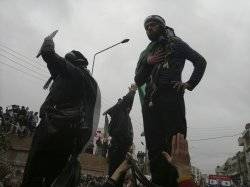Obama for raising pressure on Syria
18/01/2012| IslamWeb
Barack Obama, the US president, has said he was looking to increase international pressure on Bashar al-Assad, his Syrian counterpart.
"Unfortunately we're continuing to see unacceptable levels of violence inside that country," Obama said in Washington on Tuesday after meeting Jordan's King Abdullah.
"We will continue to consult very closely with Jordan to create the kind of international pressure and environment that encourages the current Syrian regime to step aside," he said.
Obama's remarks came as Syria indicated, according to an Arab League source, that it is ready to let the group's 165 monitors extend their mission by a month. Syria, however, opposes broadening the scope of the mission, the source said.
Its mandate expires on Thursday. Arab foreign ministers are set to discuss the team's future on January 22.
"The outcome of the contacts that have taken place over the past week between the Arab League and Syria have affirmed that Syria will not reject the renewal of the Arab monitoring mission for another month ... if the Arab foreign ministers call for this at the coming meeting," the League source said.
Military intervention
Earlier on Tuesday, Syria rejected any plans to send Arab troops into the country, saying it will "confront" and "stand firm" against military intervention after the ruler of Qatar said in a television interview that Arab countries should step in with force.
The state-run SANA news agency quoted a "credible source" at the foreign ministry as saying on Tuesday that the country is "shocked" by the Qatari emir's comments, which "could worsen the conflict and kill the chances of Syria working closely with Arabs".
The source warned that it will be "unfortunate to see Arab blood flow on Syrian soil".
Sheikh Hamad bin Khalifa Al Thani was quoted by an American television programme on Sunday as suggesting that Arab troops should be sent to Syria to stop the deadly violence.
The interview, which was conducted late last year, was the first time an Arab leader had called for the deployment of troops inside the country.
The initially peaceful uprising against Assad was met with deadly force and mass arrests and has in recent months turned into a militarized conflict between the government on one side and army defectors and armed civilians on the other.
Qatar, which once had close relations with Damascus, has been a harsh critic of crackdown and withdrew its ambassador during the summer.
Since revolts began to sweep the Arab world in December 2010, Qatar has aggressively supported opposition movements, most prominently in Libya, where it trained, armed and guided the fighters who overthrew the country's longstanding ruler, Muammar Gaddafi.
The Syrian foreign ministry source told SANA on Tuesday that "it will be unfortunate to see Arab blood flow on Syrian territory just for the purpose of serving known agendas, especially that the foreign conspiracy against Syria has become very clear".
PHOTO CAPTION
Demonstrators protest against Syria's President Bashar al-Assad in Marat al-Numan near the northern province of Idlib, January 15, 2012
Aljazeera

